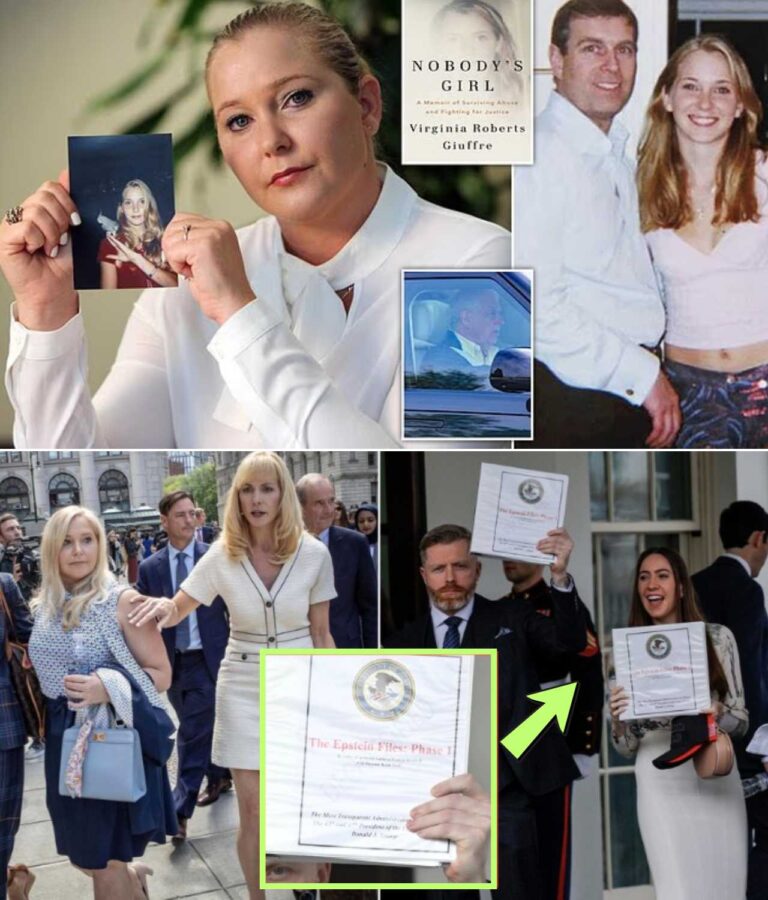The studio that night did not resemble a comedy stage. It felt closer to a public arena, lit for a spectacle of humiliation. Red neon commands — APPLAUSE and LAUGH — glared down like orders rather than invitations. Behind the scenes, producers whispered into their headsets with uneasy expressions, aware that something unusual was about to unfold. Everyone knew who the target was meant to be. Jimmy Kimmel, recently suspended indefinitely by ABC and stripped of his late-night platform, sat before an audience that expected to see him broken, a host without a stage, a comedian denied his monologue.

Into that charged atmosphere walked Karoline Leavitt. She carried herself with the confidence of someone prepared for a coronation, her dress gleaming under the lights, her smile sharp and deliberate. The crowd leaned forward, eager for the cruelty that was to come. She wasted no time in delivering it. With a sneer, she labeled Jimmy “the unemployed thug of the 21st century” and said Disney had discarded “the most useless thing television has ever seen.” The audience erupted in cheers and whistles. She pressed on, describing him as “a washed-up boxer punching shadows,” “a jester expelled from the king’s court,” “a man whose only talent was wasting airtime.” Each insult landed like a strike, and cutaway shots showed pundits smirking with satisfaction. Outside, conservative media amplified the mockery. Hashtags exploded across social platforms: #GoodbyeKimmel, #DeadAirJimmy, #DisneyFinallyDidIt. For a moment, it seemed as though Jimmy’s career had been permanently buried.
But through the noise, Jimmy sat in silence. The camera lingered on him in profile, his jaw set, his eyes steady. To the raucous crowd, his quiet appeared like surrender. To Leavitt, it seemed to grant permission to push further. She mistook restraint for weakness and sharpened her taunts, suggesting he might as well sell lottery tickets on Hollywood Boulevard, adding that even late-night infomercials carried more value than his monologues. The laughter grew louder, frenzied in its cruelty. Yet Jimmy’s silence was not submission. It was something gathering beneath the surface, invisible but rising.
Then, without script, mic, or theatrics, Jimmy stood. The room hushed, curiosity outweighing scorn. The condemned man, they assumed, was about to utter his final, feeble words. Instead, he locked eyes with her and delivered a line that would echo far beyond the studio. His voice was calm, steady, and sharp: “I lost a show, while you never had a show to lose.” Twelve words. Precise. Surgical. The laughter cut off mid-breath, replaced by gasps. Cameras wavered as the energy shifted. The blow had reversed direction, and suddenly Karoline was the one unraveling.

Her smile faltered, her composure slipped, and her confidence seemed to evaporate on the spot. Within moments, she turned and walked offstage. The chair she left behind, lit starkly by the spotlight, became a haunting image. Empty, abandoned, symbolic. Screenshots of that glowing chair began spreading online before the night ended.
Within minutes, social media erupted. The hashtags #EmptyChair, #Jimmy12Words, and #HistoricSlap trended globally. Clips circulated in endless loops: Jimmy’s silent profile, the single devastating sentence, Karoline frozen in place, and then her retreat. Memes flourished overnight. T-shirts emblazoned with “I LOST A SHOW, WHILE YOU NEVER HAD A SHOW TO LOSE” sold out by morning. Conservatives scrambled to regain control of the story, editing clips to remove Jimmy’s retort and focusing only on her insults, but the uncut footage was already everywhere. Every attempt at spin drowned under the weight of the original video.
Progressives celebrated. Rachel Maddow described it as “a mic drop without a mic.” Trevor Noah quipped, “Twelve words stronger than twelve years of punditry.” AOC tweeted that “dignity is louder than cruelty.” John Oliver devoted a segment to “the empty chairs of history,” crowning Leavitt’s walk-off the most humiliating exit in modern politics. Across campuses, protests projected the glowing empty chair onto walls, while unions borrowed Jimmy’s twelve words for rallying cries.
Disney’s suspension of Kimmel, intended to quiet controversy under FCC pressure, instead transformed him into a symbol. What was meant to silence a liability created a martyr. By stripping him of airtime, they inadvertently handed him a timeless moment. His words became a rallying call far beyond entertainment, used in speeches and demonstrations, immortalized in memes and merchandise.

Meanwhile, Karoline Leavitt’s fortunes collapsed. Invitations to appear dwindled. Her online presence filled with mocking chair emojis. She attempted to insist that walking away was her choice, but the footage betrayed her. The defining image of her career became the empty chair under the spotlight, a symbol of retreat and defeat.
Weeks later, the clip still circulated, the hashtags still resurfaced, and the memes continued to evolve. Jimmy had not yet reclaimed his late-night throne, but he no longer needed it. Losing a show had paradoxically granted him a legacy. Karoline had not only lost the exchange; she had lost her credibility.
As the dust settled, the lesson was inescapable. Mockery is fragile, punching down is dangerous, and silence, when wielded with precision, can be devastating. Twelve words outlasted a hundred jeers. One empty chair outweighed an entire mob. And Jimmy Kimmel, denied his stage, proved he never needed it to win.





